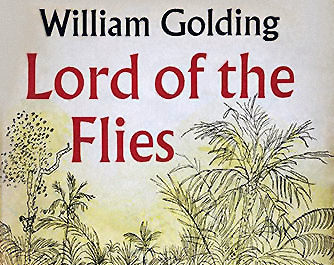“Lord of the Flies,” which celebrates its 60th birthday this week, has its bloody fingerprints all over our cultural map.
The drama, urgency, and angst of William Golding’s pre-teens have resurfaced in popular movies and books today. Golding’s marooned schoolboys struggled for self-expression, survival, and humanism in a rugged natural setting where both adults and reliable moral exemplars were largely absent.
We find similar desperate dynamics in the wild arenas of today’s “Hunger Games,” in Veronica Roth’s “Divergent” series (over 10 million books sold), and in a fair number of high school cafeterias.
The ripples from Golding’s work also extend to music (U2’s debut album references the book), the fiction of Stephen King, and an episode of the television series “The Simpsons.” According to Google search engines, over the past 20 years, “Lord of the Flies” has been referenced in books more frequently than Tolkien’s blockbuster “Lord of the Rings.”
What accounts for the novel’s enduring reach across six decades?
One answer is that “Lord of the Flies” offers a model of storytelling that is still emulated today.
“Flies” fuses strange, uncanny, other-worldly experiences (the boys’ isolation on a tropical island stalked by a mythical “Beast”) with a set of enduring themes.
How does Golding engage his readers with this potentially alienating mix of idiosyncratic setting and heavy messaging? Most of us have never worshipped a pig’s head, and fewer still are eager to be lectured about the failings of human nature. So what keeps us turning the pages?
The answer is that we care about Golding’s characters. We see ourselves in their emotions, their triumphs, and especially their weaknesses. When the flawed protagonist Ralph behaves cruelly to Piggy, we despise him, but we can’t avoid despising ourselves. Golding makes us think about our own lack of charity, our unforgiving cliques, our stubborn tribalism — experienced as adults as well as children.
Besides wanting to spend more time with Piggy, and Simon, and even Jack, we come back to “Lord of the Flies” because it raises the proverbial Big Issues which remain as pertinent and threatening today as they were in 1954.
These themes include the obvious. As Golding puts it, there is a “darkness of man’s heart” which we must actively battle and plan against. But, more interestingly, the author is preoccupied with a concern voiced by Ralph, “What makes things break up like they do?”
Golding’s answer is borrowed from the ancient Greeks: our problems of governance reflect who we are. Each form of rule has its unique problems, and democracy is no exception.
In the world of “Lord of the Flies,” and in our political communities today, these troubles appear in several forms.
To begin with, Golding’s island is cleaved by the competing leadership of Ralph and Jack. It’s not just that there’s no consensus about who should govern. The larger problem is that these leaders represent different, and contradictory, desires held by their followers: smoke signals, rescue, and law on one side, and feasts, security, and hunting on the other.
These competing claims to rule rupture the island in a manner familiar to today’s Americans, particularly those weary of “hyper-partisanship,” but unsure how to transcend it. And, of course, many of our most trenchant political problems are a product of citizens’ unceasing hunger for competing goods, and politicians’ unceasing willingness to serve them. Decades of lower taxes and more services add up to a $17 trillion in national debt.
In these ways, “Lord of the Flies” makes the implicit case that our biggest challenges as a species are of our own creation. The stranded boys come to a bad end not because of storms, or food shortages, or their physical seclusion, but because of their self-absorption, anxiety, and inability to corral fear and emotionalism.
For contemporary citizens worried about global warming, water shortages, pandemics, and religious extremism, Golding’s sources of conflict and disorder seem terribly close at hand.
In the end (and Golding tells us that end will be filled with fire and smoke and lethal, pointed sticks), we continue to read and reference and be disturbed by “Lord of the Flies” for its unforgiving reminder that all too often the fault lies not in the stars, but in ourselves.
Bruce Peabody is a Professor of Political Science at Fairleigh Dickinson University in Madison, New Jersey.







That and the fact that so many middle schoolers read it year after year.
“Flies” is believable. That is what makes us shudder when we remember it.
“our stubborn tribalism” has been harvested quite efficiently by Rush (The Lump), Bleck (say it like a dry heave) and FOX, et al.
Without that blind nativist prejudice, all the right wing bloviators would be revealed for the cheap provocateurs they really are.
EXCELLENT article!
It’s a shame Ralph and Jack didn’t have crap polls and a rudimentary cable ‘news’ channel…